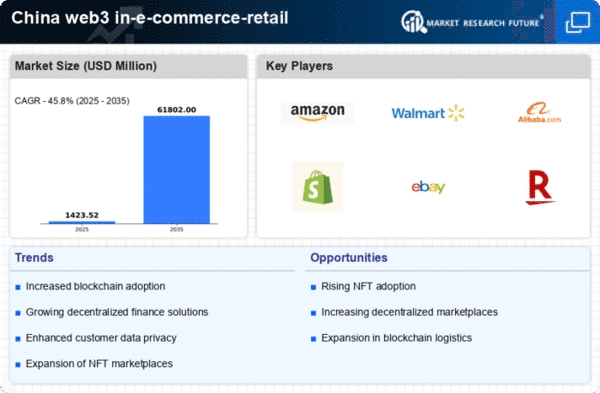Consumer Demand for Privacy
In the web3 in-e-commerce-retail market, there is a growing consumer demand for privacy and data protection. Chinese consumers are increasingly aware of their digital footprints and are seeking platforms that prioritize their privacy. As of November 2025, surveys indicate that over 60% of consumers prefer shopping on platforms that utilize decentralized technologies, which offer enhanced privacy features. This shift is prompting retailers to adopt web3 solutions that minimize data collection and empower users with control over their personal information. Consequently, businesses that align with these consumer preferences are likely to gain a competitive edge in the evolving landscape of the web3 in-e-commerce-retail market.
Growth of Digital Currencies
The growth of digital currencies is a significant driver in the web3 in-e-commerce-retail market. In China, the increasing acceptance of digital currencies, including the digital yuan, is transforming payment methods in retail. As of November 2025, it is estimated that transactions using digital currencies account for approximately 25% of all online purchases. This shift is encouraging retailers to adopt web3 payment solutions that facilitate seamless transactions and reduce transaction fees. Furthermore, the Chinese government's push for digital currency adoption is likely to bolster consumer confidence and drive further growth in the web3 in-e-commerce-retail market, as more consumers embrace these innovative payment options.
Rise of Blockchain Technology
The adoption of blockchain technology is a pivotal driver in the web3 in-e-commerce-retail market. In China, the integration of blockchain solutions enhances transparency and security in transactions, which is crucial for consumer trust. As of November 2025, approximately 70% of e-commerce platforms are exploring blockchain applications to streamline supply chains and reduce fraud. This technology allows for real-time tracking of goods, thereby improving operational efficiency. Furthermore, the Chinese government has been supportive of blockchain initiatives, indicating a favorable regulatory environment. This synergy between technology and regulation is likely to propel the web3 in-e-commerce-retail market forward, as businesses seek to leverage blockchain for competitive advantage.
Integration of Artificial Intelligence (AI)
The integration of Artificial Intelligence (AI) into the web3 in-e-commerce-retail market is becoming increasingly prevalent. AI technologies are being utilized to enhance customer experiences through personalized recommendations and efficient inventory management. In China, it is reported that AI-driven solutions can improve sales conversion rates by up to 30%. As of November 2025, many retailers are leveraging AI to analyze consumer behavior and optimize their offerings accordingly. This technological advancement not only streamlines operations but also aligns with the expectations of tech-savvy consumers who seek tailored shopping experiences. Thus, the incorporation of AI is likely to be a key driver in the evolution of the web3 in-e-commerce-retail market.
Emergence of Decentralized Autonomous Organizations (DAOs)
The rise of Decentralized Autonomous Organizations (DAOs) is reshaping the web3 in-e-commerce-retail market. DAOs enable collective decision-making among stakeholders, fostering a sense of community and shared ownership. In China, the establishment of DAOs is gaining traction, with several e-commerce platforms experimenting with this model to enhance customer engagement. As of November 2025, it is estimated that around 15% of new e-commerce startups are structured as DAOs, allowing consumers to participate in governance and profit-sharing. This trend not only democratizes the retail experience but also aligns with the values of younger consumers who prioritize community involvement, thereby driving growth in the web3 in-e-commerce-retail market.
















